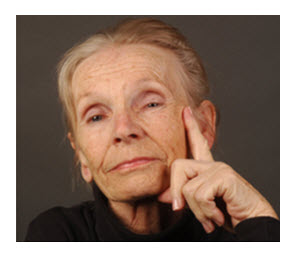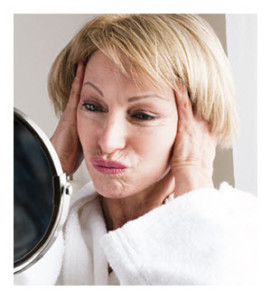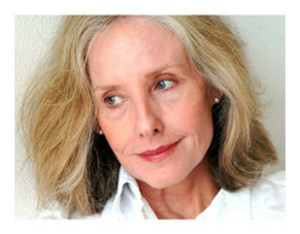Picture yourself older. Really older. What do you see? More importantly – how do you feel?
 If you are a woman, if you are beginning to see signs of age, if you are worried about what that may mean for your personal life, your ability to earn a living, your sense of who you are in the world and how others will treat you – do you feel vulnerable? Perhaps a bit uneasy?
If you are a woman, if you are beginning to see signs of age, if you are worried about what that may mean for your personal life, your ability to earn a living, your sense of who you are in the world and how others will treat you – do you feel vulnerable? Perhaps a bit uneasy?
I won’t say that I don’t prefer my face as it was 10 years ago.
I do.
But I prefer who I am now, the woman I have become, the individual I have grown into.
Isn’t that the way of things as the years progress? With experience, regardless of the toll it may take, don’t we hope for wisdom, for compassion, for the maturity to recognize our place, the value of time, whatever we believe truly matters?
Aging is Inevitable. Gracefully, a Different Story
We grow older if we’re lucky, and luckier still if we do so in good health and with people we love. We may move gently into our older bodies, or we may go kicking and screaming (and armed with Botox).
We may adopt a strategy of good nutrition, regular exercise, moderating stress as best we can, while doing what we deem reasonable to “keep our looks.”
If we’re smart, we focus on meaning – whatever its sources.
Personally, I consider that approach essential to aging gracefully.
Of course if elder care in this country resembled some of the models I saw in Europe years ago – generations living together or in close proximity, older people enjoying the company of children and young adults (to the advantage of all) – I would have fewer concerns for those I love, for myself, for my children’s futures. Naturally, I understand the way families scatter across our enormous country for schooling and for jobs; my own sons are hundreds of miles away from home. Consequently, we do what we can.
At the very least, if caring for our elders is informed by love as much as a sense of responsibility, it’s a step in the right direction.
Unscripted, Unforgettable, the Gift of Touch
I am tired this morning and my writing is inelegant. I’ve lived a blurry stream of days that haven’t gone according to plan, and my agenda is overflowing with personal and professional tasks, most with aggressive deadlines.
So I’ve skimped on sleep. I’ve munched to stay alert. My priorities have been elsewhere. And rightfully, in my opinion.
Someone I love hasn’t been well, and there have been unanticipated hours at her bedside – holding her hand, talking quietly, sitting silently, allowing her to doze with her head on my shoulder, or our fingers linked together.
At one point, she stroked my arm and told me it felt cool and smooth and good. In that unforgettable moment, I realized that my skin is comforting to her, though of late I only notice the loss of its satiny texture and my own process of aging.
More importantly, it occurred to me that it has to be decades since this lovely woman was held passionately, and many years since anyone simply touched her in no hurry and with no other purpose than affection, connection, caring.
Allowing Our Elders to Express Their Fear
However intermittently, becoming a vessel to hold and accept this woman’s fear is, strangely to say, an honor. That she trusts me, that she feels sufficiently comfortable with me, that she can be who she is may perhaps be in part because I am not blood kin. She can express what she feels, and I do not diminish or deflect it.
 Is it really so hard to imagine ourselves still wanting to be a “me,” not wanting to be alone, not wanting to be dismissed by others because the face and figure say we are no longer in our prime?
Is it really so hard to imagine ourselves still wanting to be a “me,” not wanting to be alone, not wanting to be dismissed by others because the face and figure say we are no longer in our prime?
Must we be so afraid of listening to what our parents and grandparents wish to say about how they feel, how they honestly feel?
If we are caring for Alzheimer’s patients, can’t we allow them the relief of describing their sense of loss when in their moments of lucidity?
Care Giving Without a Schedule
There was one day when her son, the man in my life, brought her to my home where she spent the day, the entire day, and the three of us were “en famille.” We went on with our business – chatting about this and that, as I tended to some of her needs and her son tended to others. We cared for her in the midst of her feeling unwell as a matter of course, as a matter of fact.
There was Gatorade and there were crackers. There was warming soup and there was sipping tea. There were movies on YouTube, the pleasures of Fernandel in the 1950s, and the sound of her laughter. There were reassurances as often as she needed.
There were tasks – my own tasks – set aside for late night hours and early morning before the light.
For that day, she had a sense of home with no pressure, no hurry, no plan. One full day and evening. This was a gift for the three of us.
To see a strong woman suddenly frail and frightened is wrenching; to put myself in her shoes doesn’t take a gargantuan effort. To offer love is simple, love informed by how we would feel if dealing alone with ache from illness, or for that matter, ache from an absence of touch.
Although my unofficial mother-in-law suffers from Alzheimer’s, she is neither withdrawn nor belligerent. On the contrary, her love comes easily, her moments of recall can be luminous, and her conversation, insightful. We need to accept who is she is now – still herself, but different.
Women Who Fear Their (Aging) Future
We will all age if we’re fortunate, yet I understand that women may feel age more painfully if they were once beautiful, and if they relied on their beauty and their sense of femininity. Yet a woman of 80 is no less a woman than she was at 60 or 40; she is older, and shouldn’t automatically be treated like a child much less patronized – even if elements of her physical or mental capacities are compromised.
Of course. We live in a culture that penalizes age as if the bell curve drops us over a cliff, frequently at 50. Women especially feel compelled to fight aging tooth and nail: we undermine the value of our maturity; we are motivated by fear of diminishing opportunity and social life; we feel inferior by virtue of the images reflected in the media. But pretending that it will not happen is counter-productive.
Planning for it, in a pragmatic and healthy way, seems a smarter alternative.
Manicures, Mothers, and Love, Informed
There are times when love arrives seemingly from nowhere and so tenderly, in a flicker of recognition that carries us to a deeper level of mutual understanding. I have experienced this over the past week: hours fall away; conversations shine; love heals.
In spending morning, afternoon, and evening with a remarkable woman who is aware of her memory losses, aware of her aging, and articulate in expressing it, I sense that she is afraid to do so. Apparently talking to me feels safe. Still beautiful at 85, she murmurs in a soft voice: “It’s terrible to grow old.”
These are the exact words my grandmother said to me one afternoon when she was in her seventies and I was a teenager. To hear them again twists time into a pretzel. I’m 17, grasping to understand.
But I’m no longer 17. And I begin to comprehend.
These moments of disclosure are spoken as if between friends, between mother and daughter, between sisters… And then we find ourselves laughing like girls again, as we page through a magazine, as I paint her nails dusty rose, as we sit together with no need for words at all.
You May Also Enjoy

As I age, I have an entirely new perspective of my mother and MIL. I have come to respect them much more and admire them for everything they’ve accomplished and endured in life. And it does show in their face. And they. are. beautiful.
So true, Lisa.
Such a beautiful post. And, yes, aging is very much on my mind. Talking about it like you do here, really helps me parse through the issues. My mother didn’t have the chance to grow old and her mother died young as well, so I know how lucky I am to even be thinking about this. I like to think that we become more powerful as we age and our beauty grows in a different way.
I agree. We are lucky, Judith. It’s so easy to lose perspective at times, focusing on the superficial rather than the substantive.
Giving, and getting outside my own head. These help me see all that is good around me. And I do think we shouldn’t be afraid to say what we really feel as we notice ourselves changing. It ought to be okay to say I’m scared, I’m disoriented, I’m a little sad. None of that needs to obscure good moments.
I would be dishonest to say that I don’t think about where I will be and how I will look in twenty years at 80. But, I really do love where I am right now. I have a goal to live life one day at a time, and not worry about tomorrow. I want to get the most joy I can out of today. Some days that is harder than others…but it is always on my mind to live the moment and not to worry. Since, we are past care giving…I occasionally think of who will help me when I need it…but quickly squelch those thoughts if they become a worry. Nice post,
I’ve been focusing on remaining functional rather than pretty. I like your description of aging gracefully. I do what I reasonably can to take care of my face and hands and hair (actually, my hair is as good as it’s ever been!) but my priority is to keep my endurance, strength and flexibility. I did my first 10K race for years last Sunday and was pleased to finish feeling reasonably well. Hiring a personal trainer to show me exercises to increase my strength (upper body and core) was a great use of money. I can now stand up from a chair or from the floor with out grunting. My weight goal is to be square in the middle of the healthy range, BMI 22, not to be a particular jeans size. I don’t diet, I just try to make healthy choices more of a habit. I’m not sure how to define old any more. I’ll soon be 58 but I know a 78 year old lady who finished the London Marathon this month in under 5 hours. I think we set our ideas based on previous generations and a lot has changed during our lifetime to make those ideas out of date; but they are comfortable in some ways.
What bothers too many of us is the loss of our looks, when really, it’s everything else. This may be my favorite post of yours this year.
That’s a thoughtful observation, Carol. We do focus on looks rather than “capacities” – including health, and all the qualities and skills we acquire that we can bring to the table.
I learn so much from your writings about your relationship and time with your unofficial mother-in-law. And I try to apply what you’ve taught me to my relationship with my wonderful mother-in-law. She is 94.5 years old and lives 2500 miles away, but you remind me how precious to me even the chance to talk with her on the telephone is. She needs so much to talk to someone who will listen to her and treat her not (just) as a “little old lady” who needs care but (also) as the vibrant, generous, multi-dimensional person she is.
Wolf,
Such a gorgeous post. I could relate to some of your points as I’ve watched my mother endure her aging moments. Aging has taken a toll on her physically, but she’s discovering new adventures as she lives on her own. Her scope is expanding and it is exciting to watch her blossom.